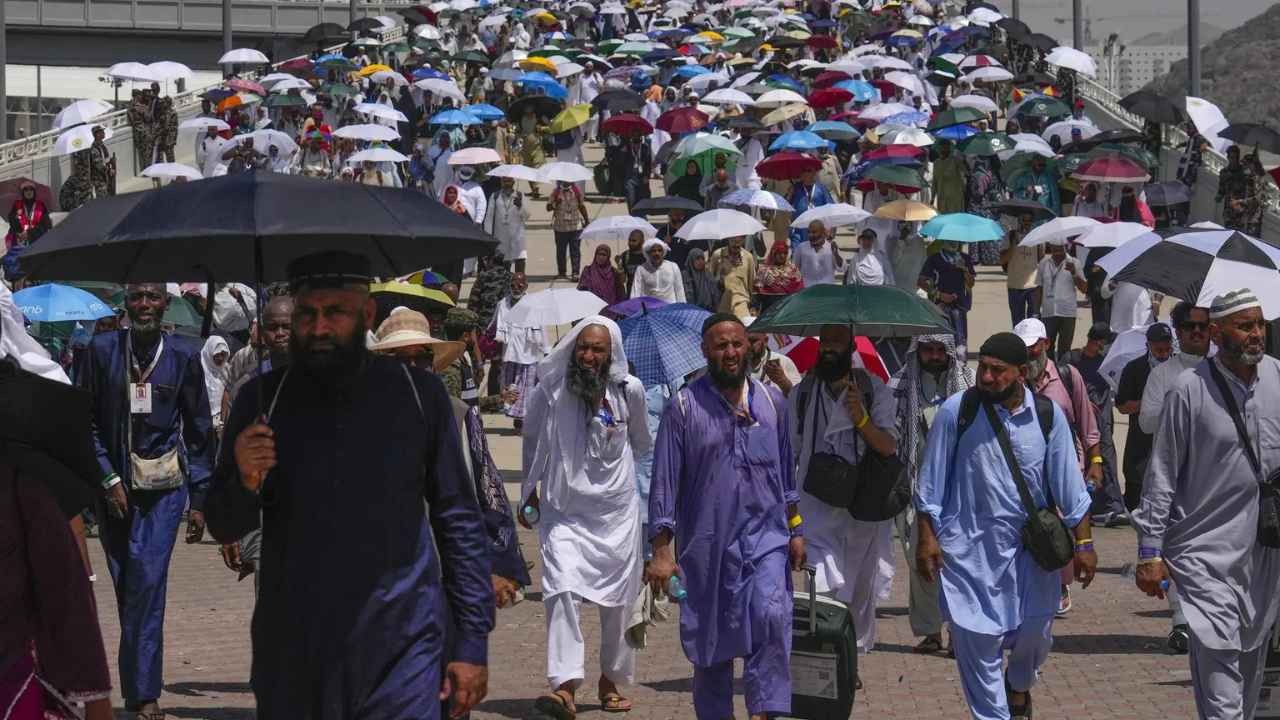NEW DELHI: The death toll during this year’s Hajj pilgrimage in Saudi Arabia climbed to over 1,000 as the intense heat wave pushed the temperature past 100° F in Mecca. The annual pilgrimage has seen around 10 countries report a total of 1,081 deaths. Earlier this week, temperatures in the holy city of Mecca reached a scorching high of 125 degrees Fahrenheit.
Fatalities have been confirmed by several countries including India, Egypt, Malaysia, Pakistan, Jordan, Indonesia, Iran, Senegal and Tunisia.
While Saudi Arabia has not provided information on fatalities, it did report more than 2,700 cases of “heat exhaustion” on Sunday alone.
“People were tired after being chased by security forces before Arafat day. They were exhausted,” an Arab diplomat told news agency AFP on Thursday.
In accordance with the customs and agreements with the Saudi Arabian government, the bodies of pilgrims who die during the pilgrimage are not repatriated to their native place, and will be buried in Saudi Arabia.
“So, bodies of both Rukhsana and Ansari have been buried there by the authorities concerned and death certificates will also be handed over to their spouses,” executive officer of the Karnataka state Haj committee, S Sarfaraz Khan told news agency PTI.
Despite the Saudi officials’ advice to use umbrellas, stay hydrated, and avoid sun exposure during the hottest hours, many Hajj rituals require pilgrims to be outdoors for extended periods during the day. Some pilgrims reported seeing motionless bodies on the roadside and overwhelmed ambulance services.
This year, approximately 1.8 million pilgrims participated in the Hajj, with 1.6 million coming from abroad. However, tens of thousands of pilgrims attempt to perform the Hajj without securing official visas each year to save money, which is more dangerous as they cannot access the air-conditioned facilities provided by the Saudi authorities along the route.
Fatalities have been confirmed by several countries including India, Egypt, Malaysia, Pakistan, Jordan, Indonesia, Iran, Senegal and Tunisia.
While Saudi Arabia has not provided information on fatalities, it did report more than 2,700 cases of “heat exhaustion” on Sunday alone.
“People were tired after being chased by security forces before Arafat day. They were exhausted,” an Arab diplomat told news agency AFP on Thursday.
In accordance with the customs and agreements with the Saudi Arabian government, the bodies of pilgrims who die during the pilgrimage are not repatriated to their native place, and will be buried in Saudi Arabia.
“So, bodies of both Rukhsana and Ansari have been buried there by the authorities concerned and death certificates will also be handed over to their spouses,” executive officer of the Karnataka state Haj committee, S Sarfaraz Khan told news agency PTI.
Despite the Saudi officials’ advice to use umbrellas, stay hydrated, and avoid sun exposure during the hottest hours, many Hajj rituals require pilgrims to be outdoors for extended periods during the day. Some pilgrims reported seeing motionless bodies on the roadside and overwhelmed ambulance services.
This year, approximately 1.8 million pilgrims participated in the Hajj, with 1.6 million coming from abroad. However, tens of thousands of pilgrims attempt to perform the Hajj without securing official visas each year to save money, which is more dangerous as they cannot access the air-conditioned facilities provided by the Saudi authorities along the route.
